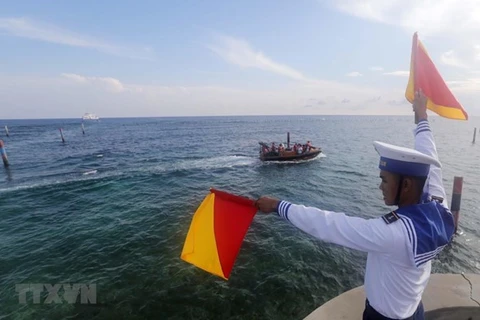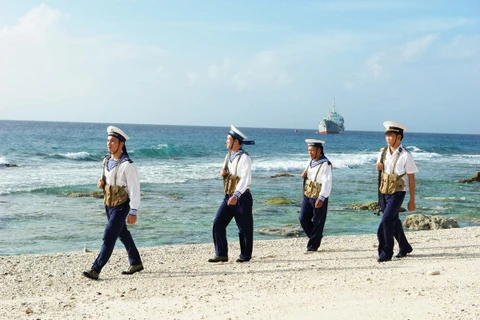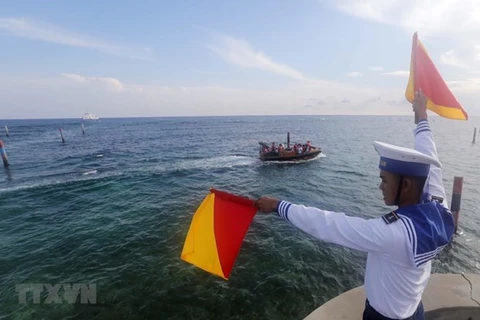Hanoi (VNA) – The international community has voiced protest against China's new moves in the East Sea, including its enforcement of a fishing ban that took effect on May 1 on the sea area covering part of the Gulf of Tonkin and Vietnam’s Hoang Sa (Paracel) archipelago and its continued deployment of ships to Bai Ba Dau (Whitsun Reef) in Vietnam’s Truong Sa (Spratly) archipelago.
The Philippines has sent two more diplomatic protests to China, saying that the continued swarming and threatening presence of the Chinese vessels creates an atmosphere of instability and is a blatant disregard of the commitments by China to promote peace and stability in the region.
In a resolution filed on April 26, 11 Filipino senators condemned China’s activities which they said caused tensions in the East Sea, affirming that the activities are a clear violation of the 1982 United Nations Convention on the Law of the Sea (UNCLOS) and the 2016 Hague tribunal ruling.
The resolution requested Beijing to respect the UNCLOS which serves as the Constitution for the oceans and is an international treaty codifying customary international law, and which does not regard the display of military might or strength as a valid means for appropriating or claiming maritime areas and resources.
Meanwhile, in the 2021 edition of the Diplomatic Bluebook released on April 27, the Japanese Government emphasized concerns over China’s military expansion and activities in the East China Sea and East Sea.
It said that China’s expansion of military capabilities that lack transparency and growing unilateral actions to change the status quo in Asian waters pose “strong concerns” in the region and to the international community.
Earlier, Japanese Prime Minister Suga Yoshihide and US President Joe Biden warned of China's aggressive moves in the region. Speaking after their talks in the White House on April 17, Suga said “We oppose any attempt to change the status quo by force or coercion”.
The European Union also expressed concern regarding the presence of Chinese vessels in many areas in the East Sea.
In a statement coursed through the European External Action Service, the EU said that the presence of the Chinese vessels at Whitsun Reef is threatening peace and stability in the region.
“The EU supports the ASEAN-led process towards an effective, substantive and legally binding Code of Conduct, which should not prejudice the interests of third parties. The EU urges all parties to pursue sincere efforts towards its finalisation,” the statement added.
The EU also urged all parties to resolve disputes through peaceful means in accordance with international law, in particular UNCLOS, including its dispute settlement mechanisms.
Addressing the Raisina Dialogue in India on April 13, Secretary General of the North Atlantic Treaty Organization (NATO) Jens Stoltenberg stated that China’s more assertive moves were challenging the rules-based international order and hampering freedom of navigation in the East Sea.
Meanwhile, the website eurasiareview.com stressed in an article that China’s increasing incursions in the sea in defiance of global norms has heightened tensions in the region.
Speaking at the Vietnamese Foreign Ministry’s regular press conference on April 29, the ministry’s Deputy Spokesman Doan Khac Viet underlined Vietnam’s objection to China’s recent fishing ban.
Replying to a question about the report that the Chinese coast guard force declared the enforcement of the fishing ban on the sea area covering part of the Gulf of Tonkin and Vietnam's Hoang Sa archipelago, the deputy spokesman reiterated that Vietnam has sufficient legal ground and historical evidence testifying to its sovereignty over Hoang Sa and Truong Sa archipelagos, as well as its legal rights towards sea areas identified in line with the 1982 UNCLOS.
Vietnam holds that measures to preserve creature resources need to be implemented in conformity with regulations of the 1982 UNCLOS and must not harm the sovereign right and jurisdiction at sea of other related states, according to Viet.
He stressed that Vietnam objects to and resolutely rejects this unilateral decision by the Chinese side, which has violated Vietnam’s sovereignty over Hoang Sa archipelago; infringed international law, including the 1982 UNCLOS; run counter to the spirit and wording of the Declaration on the Conduct of Parties in the East Sea (DOC); and gone against the agreement on basic principles guiding the settlement of sea-related issues between Vietnam and China.
He again declared that any act harming Vietnam’s sovereignty over Hoang Sa and Truong Sa archipelagos, as well as the country’s sovereignty, sovereign right, and jurisdiction over its sea areas is valueless and not recognised, and Vietnam resolutely objects to such acts./.
The Philippines has sent two more diplomatic protests to China, saying that the continued swarming and threatening presence of the Chinese vessels creates an atmosphere of instability and is a blatant disregard of the commitments by China to promote peace and stability in the region.
In a resolution filed on April 26, 11 Filipino senators condemned China’s activities which they said caused tensions in the East Sea, affirming that the activities are a clear violation of the 1982 United Nations Convention on the Law of the Sea (UNCLOS) and the 2016 Hague tribunal ruling.
The resolution requested Beijing to respect the UNCLOS which serves as the Constitution for the oceans and is an international treaty codifying customary international law, and which does not regard the display of military might or strength as a valid means for appropriating or claiming maritime areas and resources.
Meanwhile, in the 2021 edition of the Diplomatic Bluebook released on April 27, the Japanese Government emphasized concerns over China’s military expansion and activities in the East China Sea and East Sea.
It said that China’s expansion of military capabilities that lack transparency and growing unilateral actions to change the status quo in Asian waters pose “strong concerns” in the region and to the international community.
Earlier, Japanese Prime Minister Suga Yoshihide and US President Joe Biden warned of China's aggressive moves in the region. Speaking after their talks in the White House on April 17, Suga said “We oppose any attempt to change the status quo by force or coercion”.
The European Union also expressed concern regarding the presence of Chinese vessels in many areas in the East Sea.
In a statement coursed through the European External Action Service, the EU said that the presence of the Chinese vessels at Whitsun Reef is threatening peace and stability in the region.
“The EU supports the ASEAN-led process towards an effective, substantive and legally binding Code of Conduct, which should not prejudice the interests of third parties. The EU urges all parties to pursue sincere efforts towards its finalisation,” the statement added.
The EU also urged all parties to resolve disputes through peaceful means in accordance with international law, in particular UNCLOS, including its dispute settlement mechanisms.
Addressing the Raisina Dialogue in India on April 13, Secretary General of the North Atlantic Treaty Organization (NATO) Jens Stoltenberg stated that China’s more assertive moves were challenging the rules-based international order and hampering freedom of navigation in the East Sea.
Meanwhile, the website eurasiareview.com stressed in an article that China’s increasing incursions in the sea in defiance of global norms has heightened tensions in the region.
Speaking at the Vietnamese Foreign Ministry’s regular press conference on April 29, the ministry’s Deputy Spokesman Doan Khac Viet underlined Vietnam’s objection to China’s recent fishing ban.
Replying to a question about the report that the Chinese coast guard force declared the enforcement of the fishing ban on the sea area covering part of the Gulf of Tonkin and Vietnam's Hoang Sa archipelago, the deputy spokesman reiterated that Vietnam has sufficient legal ground and historical evidence testifying to its sovereignty over Hoang Sa and Truong Sa archipelagos, as well as its legal rights towards sea areas identified in line with the 1982 UNCLOS.
Vietnam holds that measures to preserve creature resources need to be implemented in conformity with regulations of the 1982 UNCLOS and must not harm the sovereign right and jurisdiction at sea of other related states, according to Viet.
He stressed that Vietnam objects to and resolutely rejects this unilateral decision by the Chinese side, which has violated Vietnam’s sovereignty over Hoang Sa archipelago; infringed international law, including the 1982 UNCLOS; run counter to the spirit and wording of the Declaration on the Conduct of Parties in the East Sea (DOC); and gone against the agreement on basic principles guiding the settlement of sea-related issues between Vietnam and China.
He again declared that any act harming Vietnam’s sovereignty over Hoang Sa and Truong Sa archipelagos, as well as the country’s sovereignty, sovereign right, and jurisdiction over its sea areas is valueless and not recognised, and Vietnam resolutely objects to such acts./.
VNA
























